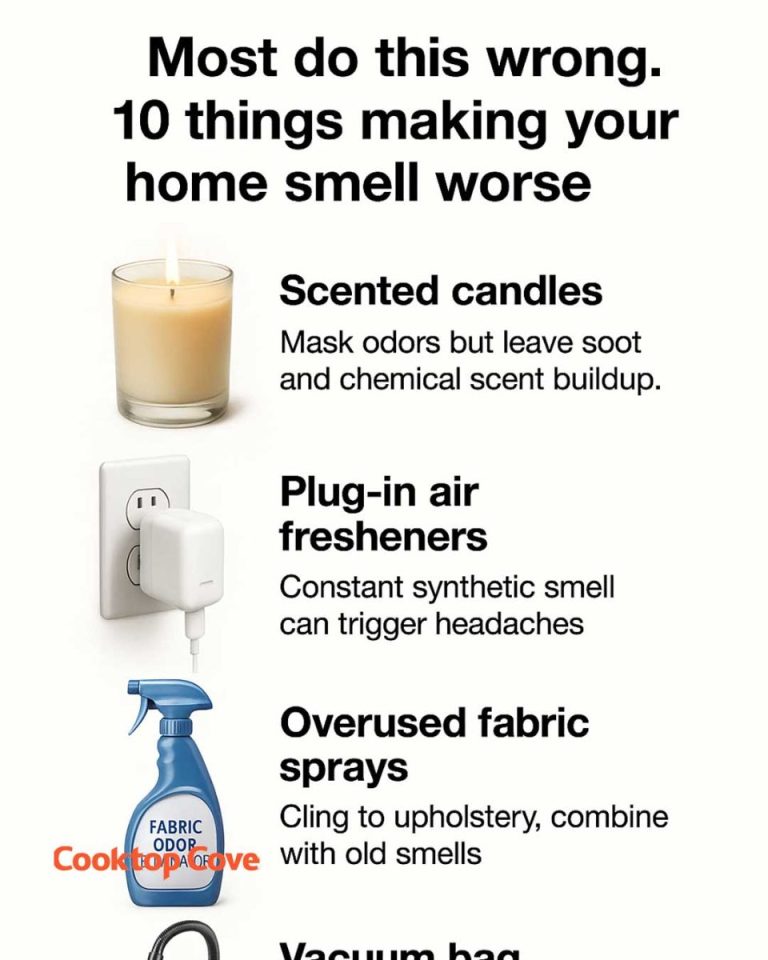ADVERTISEMENT
A pleasant-smelling home is often a top priority for many homeowners, as it contributes to a welcoming and comfortable environment. However, achieving this can sometimes be more challenging than anticipated. Many people unknowingly engage in habits that can actually make their homes smell worse, despite their best intentions. Understanding these common pitfalls can help you maintain a fresher, more inviting atmosphere in your living space.
In this article, we will explore ten common mistakes that can contribute to unpleasant odors in your home. From overlooking the root causes of smells to over-relying on artificial fragrances, these missteps can easily be avoided with a little knowledge and effort. By addressing these issues, you can ensure your home remains a pleasant place for both you and your guests.
1. Ignoring the Source of Odors
One of the most common mistakes people make is ignoring the root cause of unpleasant odors. Instead of masking smells with air fresheners, it’s crucial to identify and eliminate the source. For instance, a lingering smell in the kitchen might be due to a forgotten spill behind the stove or a clogged drain. Taking the time to thoroughly clean these areas can prevent odors from persisting.
Additionally, regular maintenance of household appliances like refrigerators and dishwashers can prevent the buildup of food particles and mold, which are common sources of bad smells. A proactive approach to cleaning and maintenance can significantly reduce the occurrence of unpleasant odors in your home.
2. Overusing Scented Candles
While scented candles can create a pleasant aroma, overusing them can lead to an overwhelming and artificial smell in your home. Burning multiple candles at once or using them in small, enclosed spaces can result in a cloying scent that becomes unpleasant over time. Moreover, some candles contain paraffin wax, which can release harmful chemicals when burned.
To avoid this, opt for candles made from natural materials like soy or beeswax, and use them sparingly. Consider using them in larger rooms where the scent can disperse more evenly, and always ensure proper ventilation to prevent the buildup of any potentially harmful fumes.
3. Relying Too Much on Plug-In Air Fresheners
Plug-in air fresheners are a popular choice for many homeowners looking to maintain a fresh-smelling home. However, these devices often contain synthetic fragrances and chemicals that can contribute to indoor air pollution. Over time, the continuous release of these substances can lead to a stale and artificial smell.
Instead of relying solely on plug-in air fresheners, consider using natural alternatives like essential oil diffusers or potpourri. These options can provide a pleasant scent without the risk of chemical exposure. Additionally, regular cleaning and proper ventilation can help maintain a naturally fresh environment.
4. Neglecting to Empty the Vacuum Bag
A vacuum cleaner is an essential tool for maintaining a clean home, but neglecting to empty the vacuum bag or canister can lead to unpleasant odors. As dust, dirt, and debris accumulate, they can begin to emit a musty smell that spreads throughout your home each time you vacuum.
To prevent this, make it a habit to empty the vacuum bag or canister regularly, ideally after each use. Additionally, consider cleaning or replacing the vacuum filter every few months to ensure optimal performance and prevent odors from developing.
5. Overusing Fabric Sprays
Fabric sprays are often used to freshen up upholstery, curtains, and carpets, but overusing them can lead to a buildup of chemicals and fragrances. This can result in a heavy, artificial smell that lingers in your home. Furthermore, some fabric sprays contain ingredients that can trigger allergies or respiratory issues.
To avoid these problems, use fabric sprays sparingly and opt for products with natural ingredients whenever possible. Regularly washing and airing out fabrics can also help maintain freshness without the need for excessive use of sprays.
ADVERTISEMENT
